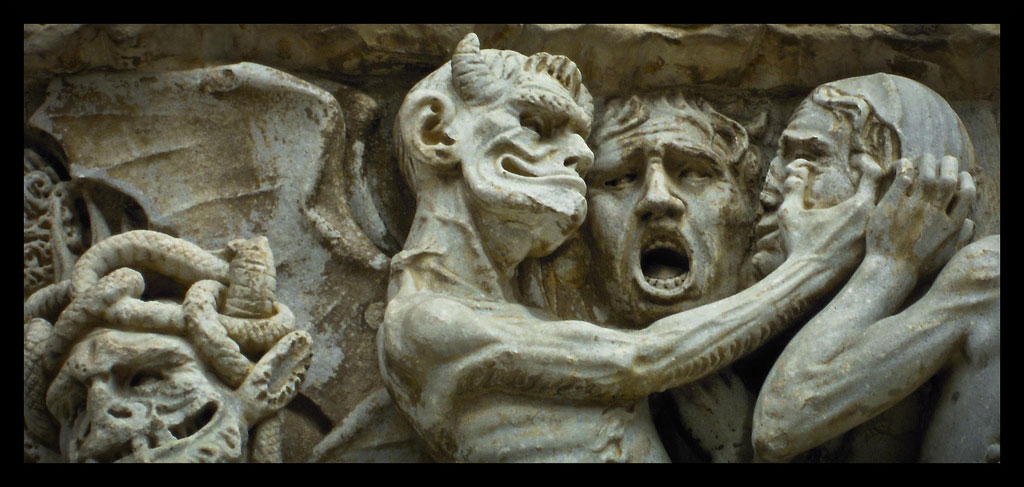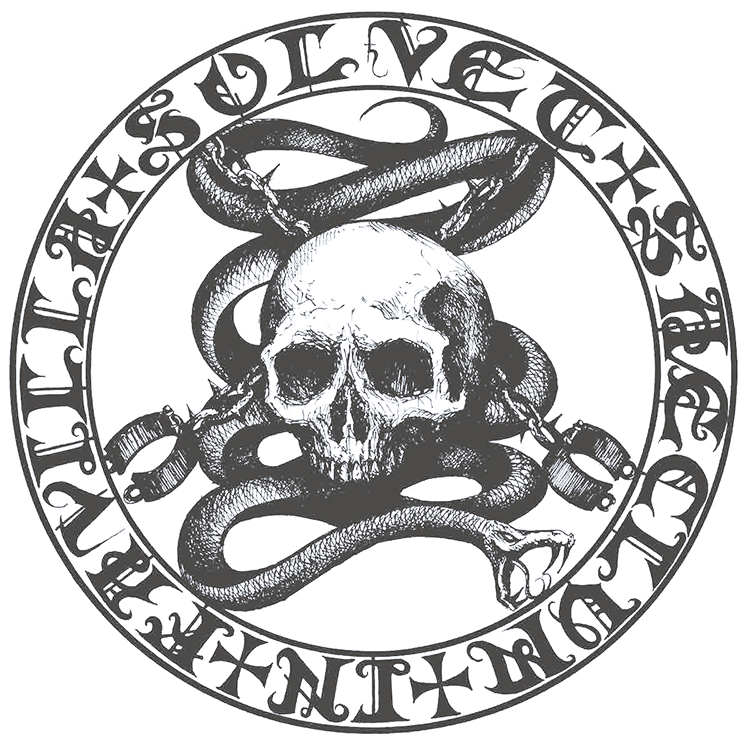Drastus
2019-04-11
by Niklas Göransson
Cold fury and flaming divinity: the nameless artist masterminding French black metal project Drastus believes that one must fully banish the spell of God within to elude the guardians of secular law.
– I wanted the new record to have a more ’played’ feel than its predecessors, which were rather ambient in both form and execution. Seeing as how the album took an entire decade to complete, each track was given ample time to develop. For example, “Nihil sine polum” was, in its initial shape many years ago, a fourteen-minute track featuring more ambient parts. When I believe myself to have finished a song, I’ll usually bury it for extended periods; this allows for the material to rot, dissolving any useless or superficial tissue and leaving only bare bones. In other words, it’s a fully developed DRASTUS here. In some sense, it could be regarded as a debut album… even if, to me, everything was already there on my first release.
So these burial urges were the main reason for the ten-year gap between albums?
– It took time mostly because I had my life to die. As for the actual music, the aspect I primarily enjoy is that of composition. Despite being a necessity on the artistic level, at least in the sense of sealing one’s work, the entire release process has vulgar connotations to me. I don’t always find the motivation, it’s enough for me to sit at home listening to and witnessing the songs evolve as they undergo their lengthy evolution. If we take a moment to consider the frequency of black metal albums released today – just noting the sheer amount of shit out there – I wouldn’t say the main problem here is me not putting out enough music. To proudly face the weighing of the heart, an artist must speak to the gods; not humans.
It’s interesting that whereas DRASTUS employed computerised drums on the debut, as opposed to humanoid percussion on the new record, I still believe myself to detect a fairly similar vibe. Despite achieving the aim of making it feel more ’played’, the sterile and dead industrial eeriness has remained. In the black metal spectrum, more gutter grime and despair than the majesty of night skies.
– Sure, you’re right in so far as atmosphere being something I cater heavily to. This will remain. Most who start out in this kind of music and attempt to compose something “dark’ tend to fall into this easy melancholy riffing; that’s the laziest form of audible darkness and holds no interest to me. I’m drawn towards a more ‘sovereign’ dark, there’s more of a challenge in bringing out such emotions. And so much wider. When I said more ‘played’ I wasn’t speaking only about the drums – there was already a drummer on my 2009 EP – but also the guitars and overall dynamic. “La CroiX de Sang” is a return to what DRASTUS was in the beginning with full-speed drumming, sharp guitar riffing, etcetera. As for any ‘gutter grime’ aspects… we’re speaking here about French black metal, after all, so I guess it’s a cultural thing. But did you really play the album under ‘majestic night skies’? This feeling of strong introspection you get from listening to it has a different resonance in such contexts. DRASTUS works for all night skies, inside or out.

I wonder if these soundscape preferences are in any way indicative of its composer’s personality. Meaning, is he the cold and calculating type or is his temperament more aligned to the fiery penchants I see strewn all across the lyrics?
– There’s a magnifying effect with the music, I hope. It’s like a condensed version of myself, of some of my faces. I don’t think I should constantly dwell on the same emotional level as my tracks… but it’s always within me; howling, more or less quietly. Living totally by the fire is disrespectful to the element. It can either warm or burn you – same energy but at a different level of vibration – but both may kill you, either by stagnation or combustion.
I was actually told beforehand that he has an unusually strong attraction to the fire element. As stated, this is also something highly prevalent in his lyrical output.
– That’s all DRASTUS is, you know: fire-snake. This attraction you refer to is partly a metaphorical infatuation, for sure, but you should never underestimate my lack of vocabulary. Such symbolism might be commonplace in this genre but it’s still strong to me. The element is also deeply inherent within satanic iconography so it’s hardly my fault that all I see is black fire. I guess all tracks could be associated with one element or another – for example, “Constrictor Torrents” is primarily linked to water. But yes, the album contains many different manifestations of fire and thus of Satan’s powers. “Nihil sine polum” portrays the flames as revealing themselves through the principle of polarity – the power of division and divider… male and female, matter and spirit, the void and the full, solve et coagula, whatever. The polar opposites, the duality, as a generator. The symbolism of fire takes a more purifying form in “Ashura”, for example, even if that’s not its main elemental presence.
DRASTUS’ lyrics don’t contain all that many theological terms. One of the few I did notice was the aforementioned Ashura, which is an Islamic commemoration of the 680 AD Battle of Karbala in present-day Iraq. This encounter spelled the end for Husayn ibn Ali, grandson of the Prophet Muhammed, as he was first intercepted by forces representing the Umayyad caliphate and then slain alongside most of his entourage and family. This event holds a central importance in Shia Muslim theology and tradition, it’s celebrated by an annual ten-day religious observance culminating in what’s called the Day of Ashura – a procession featuring expressions of mourning and self-flagellation.
– First and foremost, and for obvious reasons, it was the aesthetics of this procession of bleeding Muslims that served as primary inspiration. But I also like the word itself, it’s a term appearing with genuine significance throughout a number of different cultures. That track, “Ashura”, is a beast in and of itself and naming it thus was like charging the music with all the word’s meaning. I have little interest in dropping theological terms every second word, it’s unartistic and doesn’t seem especially ’ésotérique’ to me. Perhaps it’s useful in masking ignorance or lack of talent? I don’t know, I just play black metal. “La CroiX de Sang” symbolises the monument of the Self; or, rather, a monument erected by the sacrificial mutilation. It’s a quest for developing the dark Self – Calvary of the Satanist, so to speak. And so is the artistic path, in my opinion, a sacrificial mutilation.
Why does one raise monuments to the Self?
– Note that I said ‘of’ the Self, not ‘to’, that’s a big difference. I didn’t raise any monuments – at least that’s not the way I see it – it just agglomerates itself all along the work. Only afterwards was it ‘intellectualised’ by a thought placed on shapeless smoke in order to crystallise it, if that can illustrate my meaning. I don’t think either music or art should ever come from formulated ideas or other intellectualisations. In my opinion, the prime impulse must come from before the intellect, the consciousness, or even my own existence. If I was all about concepts, I’d be writing books instead of playing music. Never forget that we build chapels on ancient pagan burial ground; the temple may change but the energetic point remains. Symbolism aside, I’m using it for efficiency rather than its inclination.
‘Psychic death’ is a Jungian term referring to the loss of subjective self-identity. In both entheogenic and esoteric contexts, the phenomenon is known as ego dissolution – temporary detachment from the Self, granting fleeting glimpses of the universe from a perception of non-duality. I’m curious if this has any relevance to DRASTUS.
– I never took LSD with the intention of practicing any entheogenic methods; despite using that kind of stuff for mystical purposes, at the time it wasn’t in an especially theorised manner. Jung might have illuminated my mind on many aspects but my ‘fiery penchants’, as you called them, didn’t allow me to be a wise college student – I started pissing on the world too early. I remember telling some forty-kilo binocular occultist who was getting cocky to take LSD and realise how his own ‘Great work’ was the equivalent of trying to start a tsunami by pissing in the ocean. He was so powerful that he couldn’t even cross the street while the little man was red… this kind of power, I wipe my ass with. ‘Le réel c’est quand on se cogne.’
But do you think it’s beneficial for an artist to dissolve the ego once in a while?
– Yes, that’s partly what I meant when stating that an artist must speak to the gods instead of living blinded by his own reflection in the eyes of others. When composing I try to reach a state of non-being, seeking to establish a ‘Materia prima’ upon which I can work. Then, and only then, can I ‘intellectualise’ and structure the work. But, in order for it to be ‘holy’, the prime has to come from before me.

Besides musical prowess, my interviewee is also known in the underground for various anti-normative conduct – activities I’m told have resulted in a bit of courting from the judiciary system. I wish to know if these transgressions against secular law and their consequences have played a significant role in the shaping of his musical project.
– Yes, more or less. Everything you live through marks you in one way or another, even the smaller things. I have no real problem with the law actually, it doesn’t exist to me; no more than something that just happens to lay in one’s path every once in a while, like dog-shit on the side-walk. Let’s just say I fell in love with the city of Rotterdam and would often go there, returning home with heavier luggage than when I left. It was something everybody was doing where I lived back then, so… criminally, I’m nothing and no one. All this was more of an ‘ésotérique’ experience to me – to see how deep I’ve destroyed the spell of God within me. All else around, causes and consequences, are just dark tunnels of purification when you have a satanic vision on it.
Do you mean you were engaging in dangerous activities to test your mindset and challenge the psyche?
– I guess, minus the ‘dangerous’ part as I never really felt in any danger. But some sense of challenge, for sure, something like confronting the Me to reach the Self. Changing your thought-structures is an important process and task in existence, especially for a Satanist. In my opinion, questioning the conditioning underlining your thinking is one of the first works a Satanist beginner should engage in. To exemplify: if you’re committing to something illegal and end up confronted by the forces of order, should the spell of God not be destroyed deep enough within you, on a moral aspect here, then your guilt will be visible on your face. And that’s when you – and whoever you’re working with, speaking from experience – are fucked. So, you’re better off working alone or you’ll likely end up fucked by God through others. The Genealogy of Morality was the first of Nietzsche’s works I ever read, I suppose that makes perfect sense. When you’re young and start questioning everything in your life, that kind of book may unleash an ocean of venom within you. And it’s still echoing all these years later.



